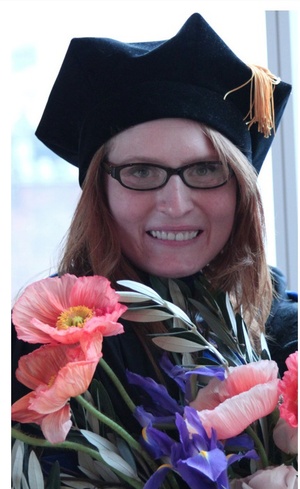From The Other Side – Dissertation Prize
October 6, 2014
by Dr. Emily Lauren Putnam

There are few experiences that can compare to writing a PhD dissertation. Even the three years of course work and preparation for the qualifications cannot match the depth and scope of research and writing necessary to successfully complete this project. For me, spending two years fully immersed in the process felt daunting and even overwhelming at times. Rarely did I find myself not thinking, reading, or writing about some aspect of the dissertation as I explored various ideas and potential research avenues. In my dissertation, I present an original reading of the Venice Biennale that explores the intersection of aesthetics, politics, and economics through the lenses of critical theory, visual studies, and performance studies. I stress how at recent iterations of the event, which are influenced by neoliberal ideology, the freedom associated with art making is placed under erasure—sous rature—making this freedom a false freedom. I lay the groundwork for my analysis with a historical review of the Venice Biennale from inception to the present, including the development of this festival as a staging ground for nations. I also examine how neoliberalism has affected the production of art in conjunction with a growing transnational art market. Without equating the aesthetic value of art with its political ends, I argue that the Venice Biennale continues to function as a site of cultural production in the twenty-first century, adapting to the changing states of world systems. The Biennale has carried Venice’s legacy as a cosmopolitan city of cultural exchange from the late nineteenth century into the new millennium.
Despite the feelings of isolation associated with this type of scholarship, I believe that it is a collaborative effort. Therefore, when I was informed that I was being awarded the IDSVA Dissertation Prize at the commencement ceremony, I felt this award acknowledges the efforts of the many people who helped bring this project into fruition (and continue to influence its development as I prepare it for publication). These people include my dissertation director, Shannon Rose Riley, who fielded my many calls and emails while rigorously critiquing my work. This award is as much the result of her efforts as it is of my own. The various faculty and academics I contacted for research guidance and feedback, including my master’s thesis advisor Stephen Ortega at Simmons College, helped enrich my understanding of the various disciplines and fields of knowledge I incorporated into this analysis. Additionally, the “critical friends,” including members of the Beverly Philosophical Society and the Mobius Artist Group, who read and discussed chapters in various forms, and were essential to improving the quality of the document. And of course, I cannot forget the friends and family who bore witness to this whole process and provided the necessary love and support to make it all possible. In risk of sounding cliché, I consider the Dissertation Prize to be recognition of all these people’s efforts—people who were able to help me even when I did not know how to help myself. Writing a PhD is no simple task—it is humbling, exhausting, but I firmly believe it is worth the effort. It is only by completing this project that I have come to appreciate and respect its significance as tangible evidence of the value of my IDSVA education.
